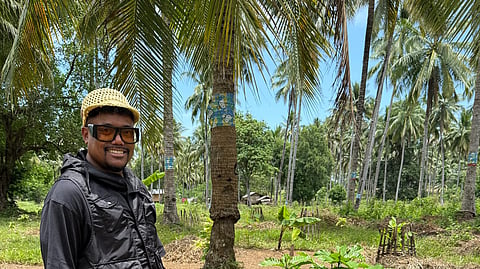
- NEWS
- the EDIT
- COMMENTARY
- BUSINESS
- LIFE
- SHOW
- ACTION
- GLOBAL GOALS
- SNAPS
- DYARYO TIRADA
- MORE

Apl.de.ap — the world-renowned Filipino member of the Grammy-winning group Black Eyed Peas — is taking his rhythm from the stage to the soil. In a heartfelt Facebook post, the global artist shared how his latest mission is rooted not in music, but in the land that first shaped him: the Philippines.
“I wanted to share with you all how thankful my team and I are for GMA’s coverage of our pilot at Esmeris Farm yesterday,” he began, referencing a groundbreaking project that’s quietly blossoming into one of the country’s most ambitious environmental and agricultural initiatives. “So many of you have reached out to us with support on how you can get involved.”
But this isn’t just another celebrity-backed sustainability effort. What Apl and his team are building could reshape the way Filipinos view farming, soil health, and the country’s potential to reclaim its agricultural legacy.
During the pandemic, Apl.de.ap found himself in deep conversation with one of the world’s leading environmental advocates, Sadhguru. Their discussions on the dangers of soil degradation would spark a chain reaction that led to the birth of his current advocacy.
“Like everything that grows, it started with the soil,” Apl wrote. “We spent our time together discussing the dangers of soil degradation and how vulnerable it makes our food supply.”
From that seed of awareness grew a discovery: biochar, an organic soil enhancer produced through pyrolysis — the heating of organic matter in a low-oxygen environment. This material, Apl learned, could restore soil fertility, increase resilience against drought, and reduce carbon emissions.
And in true Filipino ingenuity, he saw opportunity in something often discarded. “We also learned that coconut husks — something thrown away in their millions across our country — was something that could effectively produce this biochar,” he shared.
Apl’s newfound agricultural passion soon caught the attention of the Philippine Coconut Authority (PCA), which has its own mission: to plant 100 million coconut trees and reclaim the Philippines’ place as the world’s top coconut producer.
“They made me the Coconut Ambassador; I was humbled in their belief in me,” Apl said. But he didn’t stop there. His team at One Mega Team for Sustainable Earth (OMTSE) went further, reimagining what large-scale planting could mean.
Instead of monocropping, which depletes soil and kills biodiversity, they’re creating food forests: coconut trees intercropped with native malunggay, coffee, and cacao. Their target? An astounding 350 million trees, a holistic ecosystem that supports both farmers and forests.
Apl’s post also included a symbolic photo: a single coffee tree standing tall in Brooke’s Point, Palawan. Planted on Earth Day 2023 between existing coconut trees and nourished with biochar, the young plant became a living testament to the project’s promise.
“In 2024, as many of you will know, an El Niño swept through Palawan, destroying many plants in its wake,” Apl recounted. “Our coffee plant was not one of them. The photo you see is Earth Day 2025, and our coffee tree is thriving. It is growing. It is strong. This is why the soil is so important.”
Through partnerships with the government, local farmers, and indigenous communities, Apl and his team envision nothing less than a revitalization of Philippine agriculture — one that goes beyond profit to embrace sustainability, biodiversity, and community empowerment.
“We are working hard with the government, small and large stakeholder farmers, the indigenous communities, offtakers, and anyone who will lend us their support,” he wrote. “Together we can do this. Together we can grow.”
Apl.de.ap’s project is more than a return to the land. It’s a call to action. A movement where music meets mother earth, and where global fame finds its truest purpose: to nurture, to protect, and to grow for generations to come.
“Together we can do this. Together we can grow.” — Apl.de.ap
